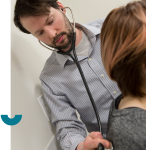Share
A Message from Your Council
What Does It Mean To Be A Professional?
As physicians, we proudly call ourselves “professionals,” but what does this really mean? I am not referring to a vocation or the legal statues which govern the same, but rather philosophically: what are the moral and ethical obligations inherent in being a physician? I have been reflecting on this question for the past couple of months and it is my opinion that the answer is far from straightforward.
Merriam-Webster notes a professional to be “characterized by or conforming to the technical or ethical standards of a profession and/or exhibiting a courteous, conscientious, and generally businesslike manner in the workplace.” As noted below, I would argue that such a definition is superficial and inadequate for the practice of medicine.
For myself, the imperative for defining what it means to be a professional is related to the infrequent but inevitable conflicts between the rights of patients and the rights of physicians. The following two cases illustrate this struggle.
- In the fall of 2019, Bill 207: Conscience Rights (Health Care Providers) Protection Act was introduced in the Alberta Legislature. As initially proposed, a member of a profession regulated under the Health Professions Act could not be disciplined for a decision “not to provide a health care service based on their conscientious beliefs.” Many have commented on what services and patient populations would most likely be affected. It is also a reality that many of our colleagues support the intent of such a bill.
- Physicians, nurses and allied health professionals are all entering negotiations with the government and given the current economic realities of the province, the next year may be contentious. The degree to which you are a “professional” will determine what action you may consider taking in protest.
Some of my senior colleagues have noted the following definition (author unknown): “Being a professional means doing what is right, when it is hard and when no one is watching.”
While I would argue this is a more relevant definition for physicians, I believe it is still inadequate.
- In regards to Bill 207, whose rights are paramount when a conflict arises: a patient’s right to access legally available care, or a physician’s right to avoid any participation in a process or service which they conscientiously object to? Whether it is a patient in a small town with a limited number of physicians available, or a frightened, vulnerable or disenfranchised patient wishing autonomy over their body, it isn’t simple or practical to say they can “find another doctor.” As professionals, if we allow our conscientious objections to trump the rights of patients, then essentially, for some Albertans, access to healthcare services becomes nothing more than a flip of a coin or random chance.As a collective, physicians in Alberta (through the CPSA) have stated we will never abandon patients who wish to access legally-available services, particularly in emergency situations. To be clear, I am not suggesting physicians practice “without conscience”-in fact, I think it is impossible to provide compassionate and high-quality care without it. Although the Ontario Court of Appeal noted that none of us have a “constitutional right to practice medicine” and many would argue the requirements to satisfy the standard of practice are minimal, we must be cognizant of the moral distress which some of our colleagues have in the context of conscientious objections. Other health care professionals may be governed under standards divergent to our own, but I am proud to say that as professionals, physicians in Alberta recognize that the rights of patients are ultimately paramount.
- As for potential job action, I am confident that, as professionals, none of my colleagues will risk the health of Albertans to support or protest negotiations. It would never cross my mind that any physician in Alberta would refuse emergent therapy for an acute myocardial infarction, an ectopic pregnancy, a ruptured abdominal aortic aneurysm or any other medical issue. In the short term, I cannot fathom physicians participating in rotating “mass sick days” or strikes. Long term, certainly physicians may alter their practices and clinical workloads based on numerous factors, including work life balance, professional satisfaction and economic viability, among others. These decisions are not those which will put the “immediate health of patients at significant risk.” I would also note that, as professionals, each of us is entrusted by society to respectfully, and at times firmly, advocate for the health and wellbeing of all Albertans. While we have a standard of practice, I believe we would all be disappointed if any of us jeopardized the health of a patient in such a regard. As professionals, physicians simply will not entertain some of the negotiating tactics other professions will consider. Ultimately, we will endeavour to respect the rights of all Albertans, even if this comes at a personal cost.
Maybe it is this balancing act-which ultimately places the rights of patients above those of our own-that is at the heart of what it means to be a medical professional? Philosophically, as physicians, we are not professionals because of the Health Professions Act. Rather, we are professionals because we “do right by our patients.”
Sincerely,
John Bradley, MD
CPSA Council President
























Comments for this post are now closed. If you would like to share your feedback on this topic, please email support@cpsa.ca.